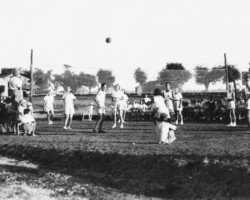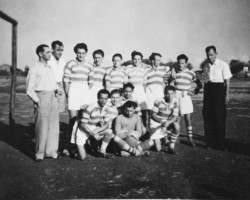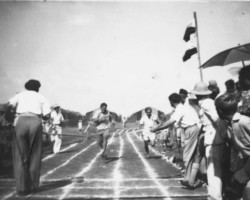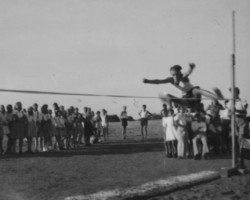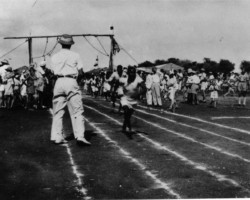Quick Links
Valivade – Sport
After leaving Russia, Poles were in a state of extreme exhaustion. Therefore, in addition to providing the body with food, efforts were made to achieve good physical condition. With this in mind, the management of the Valivade settlement, as early as July 25, 1943, shortly after the arrival of the first refugees and their settlement, established the Physical Education Department, whose task was to arrange sports fields, provide equipment necessary for practicing a given sport, as well as organize and supervise sports events. Tadeusz Szul was appointed the director. He had a deputy and an instructor to help him.
After only a year, the estate had three main squares for the use of all residents and 12 courts located at schools, intended for playing volleyball and basketball. At that time, there were 24 school sports teams and four extracurricular teams. These teams were partially equipped with costumes, slippers and necessary equipment, including balls. By July 1944, 29 official sports games had been held, and some of them also involved Indian teams (made up of local natives, sometimes with employees of the local maharaja’s palace) invited to compete with Poles – in volleyball, football or table tennis. The English were less often opponents of the residents of the estate. The report of the Physical Education Department for December 1944 reported: “In November, further tidying up of the courts took place. The running track and the volleyball and basketball courts were completely finished, providing them with permanent boundaries using bricks. This type of boundary consolidation will also include the remaining fields for both sports games and athletics. The construction of a tennis court has also been completed and will be put into use in early December. Based on the plans developed by the department, the construction of four fields was completed on the grounds of the educational facility: three for volleyball and one for basketball. A frame gymnastic device with ladders, swings and climbing ropes was also built in. Two volleyball matches were played. The first match was played by the educational facility team and the Indian team. The score was 2:1 in favor of the facility team. In the second match, the junior high school team and the educational facility team, 2:1 in favor of the junior high school team. Tadeusz Szul was the referee. Out of the four football matches, three were played between the estate team and the Indian team. The results of the first two matches were 5:0 and 2:0 in favor of the estate team, while the third match was 2:1 in favor of the Indian team. The fourth match was played between the English and Indian teams, ending with the English team winning 3:0. The referee was T. Szul […].
Undoubtedly, great contributions to the development of sports in the estate were made by Professor Henryk Katkiewicz, who, as a physical education teacher in junior high school classes, apart from physical exercises, taught the basic rules of team games such as volleyball and basketball.
The first one enjoyed great popularity in the estate (in 1944 the Polish Ministry of Religious Denominations and Public Enlightenment funded a silver, walk-through cup for the winning volleyball teams of the estate in Valivade; the scout volleyball team under the care of comrade Zdzisław Peszkowski, winning the games three times in a row, took it for themselves). Next in line were basketball and football (the estate had its own team in this discipline, it competed with the Indians and the English). Competitions such as lawn and table tennis, shooting, swimming, kayaking, gymnastics and athletics also had their supporters. The newspaper “Polak w Niechciał” from the autumn of 1944 reported: “In the current. In the 1944 school year, all the youth from grades V and VI of primary schools, junior high schools and partly of the educational institution, in the total number of over 900 people, were obliged to take part in afternoon games and athletic exercises organized by the Physical Education Department. Nine sightseeing and sports trips were organized, including seven by car and two by bicycle. The monsoon season is not conducive to games, sports exercises, competitions and trips. After it ends, sports activities will revive again, there will be further official games and exercises and it may be possible to implement other projects that the Physical Education Department has, such as: setting up a small-caliber shooting range, organizing (together with the scouts) shooting competitions and allocating a special area for school gymnastic exercises and shading it with a roof in order to enable exercises to be conducted during the heatwave”. The weather indeed often had an impact on the possibility of conducting sports activities. For this reason, a special sports club was opened for the use of the youth, equipped with various games and a table tennis table. It was extremely popular, especially during the monsoons.
The crowning achievement of sports activities in the estate was the Sports Competition Week. Here, individual teams and individual athletes competed for the highest distinction, which was winning first place. One of these sports weeks took place at the beginning of June 1947. Competitions were organized in tennis, swimming, football, volleyball, table tennis and athletics. Races and games with prizes were also organized for the younger ones. Not only Poles but also Indians took part in the competitions. Among others, the Indian commandant of the estate, who not only gave the initiative to organize the joint competitions, but also showed active interest and help throughout their duration. On June 7, the finals and the award ceremony took place in the presence of the resident of the Principality of Kolhapur and numerous guests.
To add splendor to the occasion, the Hindu police band from Kolhapur played. The prizes, some very nice and valuable, came from Polish and Hindu donations.
For a complete picture of sports in Valivade, it is worth mentioning that the Panchganga River flowed through the northern part of the estate, but swimming competitions were something of an anomaly, because despite the proximity of the magnificent river, access to it and swimming were officially prohibited and punishable by confiscation of clothing and a fine. Despite this, there were a large number of water sports enthusiasts (older youth, including scouts, and adults liked to sail on it in kayaks made in the estate), nevertheless, the above prohibitions had their justification, because several young people paid with their lives for participating in swimming escapades.
